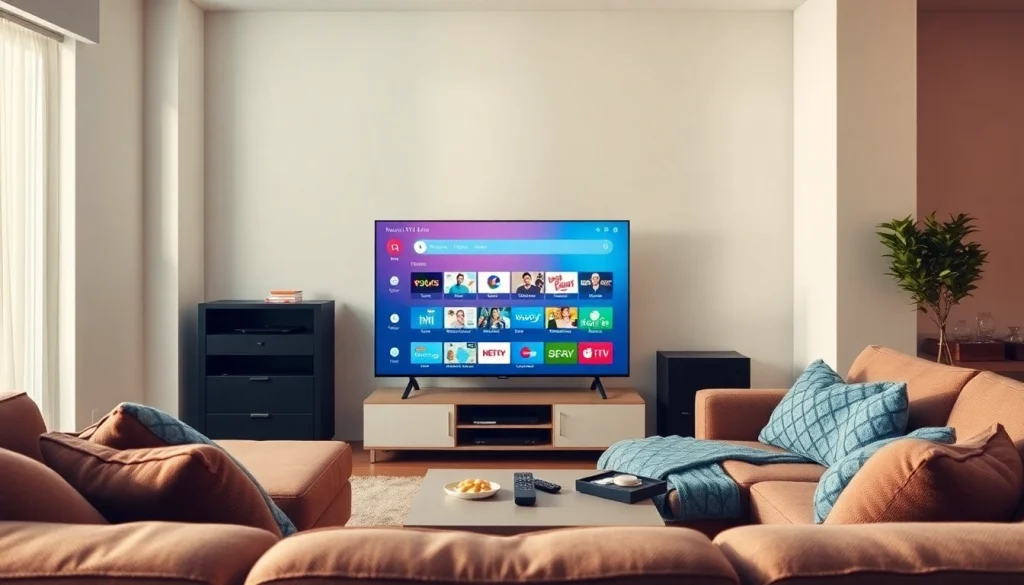
Understanding IPTV and Its Advantages
What is IPTV?
IPTV, or Internet Protocol Television, is a system that delivers television programming and other video content through the internet rather than through traditional terrestrial, satellite, or cable formats. With IPTV, content is sent using the same manner as other internet data, transforming how users consume television by relying solely on their internet connection.
This delivery model has gained immense popularity due to its flexibility and accessibility. Subscribers can watch their favorite shows and movies anytime, anywhere, on various devices, including smart TVs, smartphones, tablets, and computers. For those seeking a reliable iptv subscription, IPTV services offer an array of options that cater to diverse preferences and needs.
Benefits of Reliable IPTV Subscription
A reliable IPTV subscription brings several advantages for viewers looking to enhance their viewing experience:
- Variety of Channels: IPTV providers typically offer a vast selection of channels spanning multiple genres, including sports, movies, news, and entertainment, accommodating every viewer’s taste.
- High Definition Streaming: Quality matters. Many IPTV services provide high-definition (HD) and even ultra-high-definition (UHD) streaming, ensuring that viewers enjoy crisp and clear visuals.
- On-Demand Content: Subscribers can access a library of movies and series that can be streamed at any time, which is a significant advantage over traditional cable packages that often operate on a fixed schedule.
- Cost-Effectiveness: Competitive pricing among IPTV options allows subscribers to select plans that fit their budget, offering savings compared to traditional cable subscriptions.
- User-Friendly Interfaces: Many IPTV services come equipped with intuitive interfaces that make it easy to navigate and find content quickly.
How IPTV Differs from Traditional Cable Services
While traditional cable services have long been the go-to for television entertainment, IPTV presents a range of differences that make it appealing to modern consumers:
- Delivery Method: Traditional cable relies on coaxial cables, whereas IPTV utilizes internet protocols to deliver content. This allows for better adaptability and scalability.
- Customization: IPTV services often allow users to curate their content packages, only paying for channels they prefer rather than a predetermined package of channels often offered by cable companies.
- Accessibility: With IPTV, users are not restricted to watching content on a single TV. They can view programming across multiple devices, including mobile phones and tablets.
- Interactivity: IPTV offers enhanced features such as interactive TV, where users can engage with content, benefit from pause-and-play features, and leverage additional options like in-app purchases.
Key Features of a Reliable IPTV Subscription
Channel Variety and Quality
One of the core considerations when selecting an IPTV subscription is the diversity and quality of channels offered. Look for providers that include popular networks across various genres, including sports, movies, international channels, and local news. Verified user experiences should highlight the reliability of these channels, featuring minimal disruptions and high-quality streaming capabilities.
Additionally, the inclusion of premium channels, pay-per-view options, and international broadcasts can significantly enhance the value of an IPTV package. If available, opt for services that allow customization, permitting subscribers to build their channel lists focusing on personal preferences.
Device Compatibility and Usability
Another vital feature is the compatibility of the IPTV service with multiple devices. A reliable IPTV subscription should support a variety of platforms, including smart TVs, set-top boxes, streaming devices (like Amazon Fire TV or Roku), smartphones, and computers. This widespread compatibility grants subscribers the flexibility to watch content on whichever device they prefer.
In terms of usability, a well-designed interface that simplifies navigation, searching, and content discovery is essential. Many IPTV services offer applications that can be downloaded on various devices, allowing for streamlined access to favorite channels.
Customer Support and Service Stability
Reliable customer support is paramount when choosing an IPTV provider. Ensure that the service offers multiple ways to contact support, such as live chat, email, or phone. Responsive customer service can resolve issues hastily, elevating the overall user experience.
Moreover, service stability is crucial. Look for providers with a strong uptime record, minimal buffering, and consistent streaming quality. Monitoring user feedback and expert reviews can help gauge the reliability of an IPTV service before committing to a subscription.
How to Choose the Right IPTV Provider
Evaluating Pricing Models and Packages
When selecting an IPTV provider, the pricing structure is a critical consideration. Many services offer tiered pricing models that range from basic packages with essential channels to all-inclusive options that cover a broader selection. Examine what is included in each package and whether the pricing aligns with your viewing habits. Some services may also offer discounts for longer subscriptions or bundle deals that can significantly reduce costs.
Examining User Reviews and Recommendations
User reviews can provide insight into the reliability and quality of IPTV services. Look for feedback on the availability of channels, the performance of the streaming service, and the level of customer support. Engaging in forums or online communities can also yield valuable recommendations. Prioritize services that consistently receive positive feedback from users regarding their viewing experiences.
Testing Free Trials and Money-back Guarantees
Before committing to a subscription, take advantage of free trial offers. Many IPTV providers offer trial periods that allow potential customers to explore their channel selection, streaming reliability, and interface usability without obligation. If a provider does not have a trial, a money-back guarantee can serve as a safety net, ensuring that if the service does not meet expectations, subscribers can retrieve their funds.
Setting Up Your IPTV Service
Hardware and Network Requirements
To enjoy a seamless IPTV experience, subscribers must meet certain hardware and network requirements. An adequate internet connection is crucial; typically, a minimum of 10 Mbps is recommended for standard definitions, while HD and UHD may require speeds of 25 Mbps or higher. Subscribers should use a wired Ethernet connection whenever possible to enhance stability and reduce buffering issues.
In terms of hardware, users will need compatible devices such as smart TVs, streaming devices, or computers. Assess whether the IPTV provider offers applications designed for your specific hardware to ensure compatibility.
Step-by-Step Installation Guide
Once you have selected an IPTV provider, follow these general steps to set up your service:
- Subscribe to the IPTV service and create an account.
- Download the application or software provided by the IPTV provider.
- Install the application on your compatible device.
- Launch the application and enter your login credentials.
- Browse the channels and customize your settings as desired.
Troubleshooting Common Issues
Common challenges arise during the installation or operational phases. Here are several issues and their potential solutions:
- Buffering: Ensure a stable internet connection. Consider using a wired connection and checking if other devices are consuming bandwidth during usage.
- Channel Unavailability: Verify that your subscription includes access to specific channels you wish to view. Check for any outages or issues reported by the provider.
- App Crashes: Ensure that the application is up-to-date. Restarting the device or reinstalling the app can also help resolve unexpected issues.
Future Trends in IPTV Subscriptions
Emerging Technologies and Innovations
The IPTV landscape continues to evolve, with emerging technologies paving the way for enhanced viewing experiences. Innovations like artificial intelligence (AI) are being used to optimize content recommendations based on viewing habits, while augmented reality (AR) and virtual reality (VR) promise to merge entertainment with immersive experiences. Advanced compression technologies are also being developed to allow more channels and higher-quality content with lower bandwidth requirements.
Changes in Consumer Behavior
As consumer behavior shifts, so too do the demands on IPTV service providers. Viewers increasingly seek personalized content experiences, leading to the growth of tailored packages and on-demand offerings. The shift towards streaming services has also prompted many traditional cable companies to adapt, offering IPTV-style services to retain customers.
Predictions for the IPTV Market Landscape
The future of IPTV seems bright, with continued growth anticipated as more users migrate from traditional cable. Increased competition among providers can lead to better pricing models and more innovative features, benefiting consumers. As user preferences evolve, providers will likely continue to enhance features such as user interface design, customer service, and the overall viewing experience, ensuring they remain relevant in a fast-paced market.






